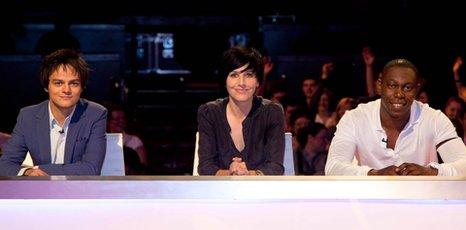UK show to bring Glee effect to charts?
- Published

Must Be The Music judges Jamie Cullum, Sharleen Spiteri and Dizzee Rascal
The warning came early in 2010 - the much-hyped first episode of Glee aired on E4 in January.
Less than a week later it had launched five singles into the top 75 of the UK singles chart.
Since then, according to the Official Charts Company, the American TV series has catapulted a staggering 42 tracks into the top 75 of the UK singles chart. And 17 into the top 40.
During its march on the charts the show has sold 1.8 million tracks, whilst all five Glee albums have gone top five - racking up 800,000 sales in the process.
New model
It is then, no big surprise, that a show in the UK is keen to get in on the act of releasing its featured music for download whilst it's on air and afterwards.
Glee has catapulted many tracks into the UK singles chart
Must Be The Music, which started last night on Sky1 HD, is a new music talent show in the vein of X Factor presented by Radio 1's Fearne Cotton and featuring Dizzee Rascal and Jamie Cullum as judges.
From the live semi-final stage (due to air 29 August) the show will make all 15 competitors tracks available for download.
Depending on viewing figures and the show's success - the new model has the potential to impact on the charts.
"We're looking for a big star," says Sky's Head of Entertainment Duncan Gray.
"The kind of star we'll create will actually sell records whilst the programmes on and make money for themselves."
At the moment the plan is for the tracks to be sold for 59p. The artist will get about 31p or 32p of that.
"This is the logical extension of shows like the X Factor and Pop Idol," he says.
'Cheapens' chart
Tinchy Stryder says the TV-to-download model "doesn't feel right"
Of course, this style of releasing music hasn't been met with universal approval.
Jon and Tracy Morter famously used Facebook to propel Rage Against The Machine's Killing In The Name to last year's Christmas number one to prevent the "X Factor monopoly on the charts".
Some artists agree with their philosophy saying this fast-tracking of musicians to peoples' front rooms feels unfair.
Chart topping rapper Tinchy Stryder: "There are a lot of artists who work hard and go into the studio and put so much effort in.
"Those shows give people that extra exposure so if they're releasing the same day as someone [like me] it makes it a bit more difficult for you to be as successful.
"Overall, it doesn't feel right. It feels better when you put your heart into it instead of going on a TV show."
Professor Green, who recently enjoyed chart success with his debut album Alive Til I'm Dead, isn't keen either.
"It does cheapen things a little bit because it becomes more for the comedy almost," he says.
But Gray denies programmes like his are providing unfair competition for hard working artists.
"I don't think it's any different from artists like Lily Allen or Little Boots using their initiative to give themselves a shot on a digital platform," he says.
"I don't think it's a deceitful route to market."
Charts' view
In reality there's little the official charts can do. Their job is to simply reflect the choices of the music buying public.
"It'll be exciting," says Martin Talbot from the official charts company. "One of the great things about the chart increasingly is that it's responding to immediate purchases by consumers."
With X Factor returning to ITV later in the month, there have been rumours that Simon Cowell's show will follow suit and adopt this new strategy.
"The bottom line is that the official charts are a mirror on the nation's music tastes," says Talbot.
"If people want to by music in enough numbers then it doesn't matter what the snobs say - basically they're reflecting popular music taste."
Must Be The Music concludes with six finalists at a live final at Wembley arena on 19 September.
- Published11 August 2010
- Published11 August 2010
- Published3 August 2010
- Published5 August 2010
- Published18 May 2010